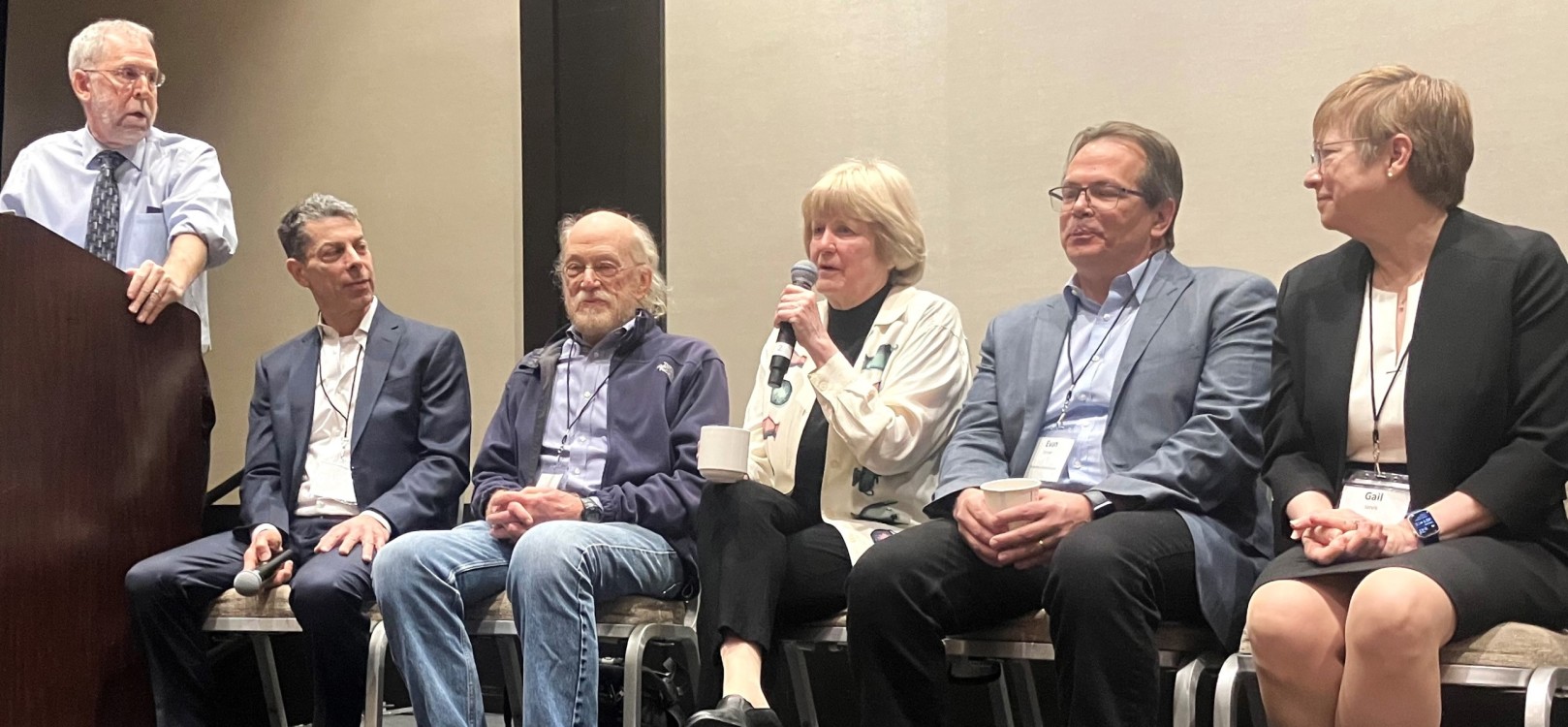 BBI's Mary-Claire King (with micorphone) comments on the future of genomics during the NHGRI-BBI panel. (Left to right): NHGRI Director Eric Green, Michael Bamshad, Bob Waterston, King, Evan Eichler, and Gail Jarvik.
BBI's Mary-Claire King (with micorphone) comments on the future of genomics during the NHGRI-BBI panel. (Left to right): NHGRI Director Eric Green, Michael Bamshad, Bob Waterston, King, Evan Eichler, and Gail Jarvik.
A panel of five BBI members participated in a lively, insightful, and frequently humorous discussion April 8 in Seattle on the Human Genome Project as part of a national training conference sponsored by the National Human Genome Research Institute (NHGRI).
NHGRI Director Eric Green, M.D., Ph.D., facilitated the discussion. His decades of experience collaborating with each of the panelists, along with his penchant for “having fun,” were in full display, likely in contrast to the expectations of 20 and 30-something graduate students and post-docs in the audience.
BBI’s Bob Waterston, M.D., Ph.D., former chair of the UW Medicine Department of Genomics, commented on his work in genomics prior to the launch of the Human Genome Project in October of 1990.
“I had been working on a physical map of the worm genome from 1985 on and by 1990 we actually had a map that was ready for sequencing,” he said. “I was also in the same department (at Washington University in St. Louis) as Maynard Olson, who was one of the architects of the genome project. I can tell you that the Human Genome Project was far from well-received.”
“Far from well-received” may be an understatement.
Green noted there was “a drumbeat of opposition to the project, starting in the advance planning stages.”
He displayed a June 5, 1990 article from The New York Times quoting a University of Utah researcher quoted as saying “The Human Genome Project is bad science, it is un-thought out science, it’s hyped science.” The individual urged other scientists with similar sentiments to write letters to Members of Congress criticizing the project.
“It would be a waste of national resources,” Green said, quoting the researcher and, noting that “5,000 letters would have a significant impact.”
Only 55 letters were sent, Green said, to an outburst of laughter among the conference attendees.
Green later asked the panelists, “When the Human Genome Project ended in 2003, how long did you think it would take before genomics would become relevant in medicine?’
“It was already relevant, especially in regard to pediatric medical genetics,” said Michael Bamshad, M.D., Professor and Division Head of Genetic Medicine in the Department of Pediatrics at the University of Washington and Seattle Children’s Hospital, and Adjunct Professor of Genome Sciences at UW. “We had already reaped some of the rewards of the Human Genome Project, including the ability to identify new disease genes. In 2003, I was thinking, ‘How do we scale discovery?’ That was a key question I was asking myself when I was at the University of Utah and one of the explicit reasons I moved to the UW – opportunities to scale gene discovery.”
'We are driving young people out of human genetics because of burdensome compliance and data restriction issues. It needs to change.' Evan Eichler
A question about what is exciting or worrying about genomics today brought insightful responses from the speakers.
“My biggest worry is how hard it is to do human genetics now,” said Evan Eichler, Ph.D., Professor in the UW Medicine Department of Genome Sciences. “There are so many issues with respect to compliance and with respect to data sharing. Researchers are becoming hamstrung. What people want to see, what families want to see are the genetic causes that underlie severe disabilities in their kids. It is a fact that we cannot share genetic data like we could even a decade ago. This limits the ability to make discoveries. We are driving young people out of human genetics because of burdensome compliance and data restriction issues. It needs to change.”
Gail Jarvik, M.D., Ph.D, Head, of the UW Medicine Division of Medical Genetics and Professor in Department of Genome Sciences, noted that she appreciates an important initiative of the National Institutes of Health.
“I am most excited about the (NIH) ‘All of Us’ project for two reasons,” she said. “One, we are finally getting scale data on diverse individuals, which has been really lacking in our field and offers a lot of opportunities for equity and wonderful discovery. And, two, because I am interested in common complex diseases where you need a lot of data. This data set will help us better understand the diseases that people die from most often.”
Finally, Green asked the scientists to forecast how genetics will be used in 2030.
“I speculate that medical genetics may cease to exist as a separate formal medical discipline, because it will be the soul of precision medicine in every field,” said Mary-Claire King, UW Medicine American Cancer Society Professor of Medical Genetics and Genome Sciences, and Associate Director of the UW MD/PhD Training Program. “Medical genetics is essential to pediatrics, cardiology, oncology, neurology, and many other specialties. Over the next few years, medical geneticists may be more formally integrated into these departments. I foresee a time when every physician will have a serious working knowledge of genetics, and those specializing in medical genetics will be doubly trained and members of these departments.
Watch the entire panel discussion here.


